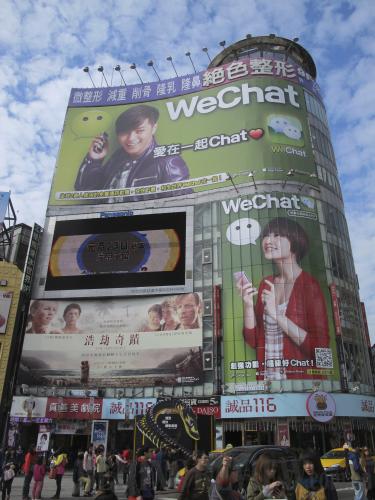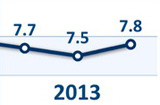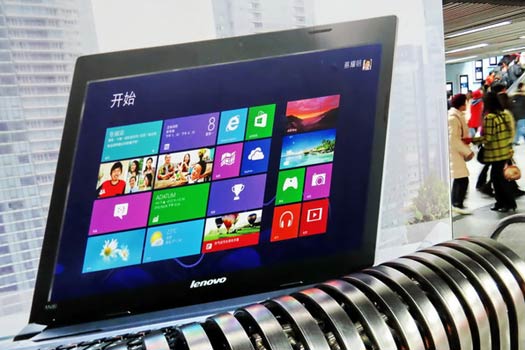WeChat striving for global expansion
Updated: 2013-08-05 13:53
|
 |
|
Giant billboard of WeChat featuring two local celebrities hang high in a commercial district of Taipei, Taiwan. [Photo/CFP] |
WeChat has made a splash in emerging nations, especially in Southeast Asia, and has yet to gain a foothold in a large developed economy like the United States, a highly coveted market. By the end of September 2012, there were 100,000 registered WeChat users in the United States, a distant cry from the numbers WeChat will need to make an impact beyond the limited population of Chinese-Americans and Chinese students studying there. To that end, Tencent opened an office in February to study the US market and form partnerships with US firms to boost the app's popularity.
In comparison with the boom in Southeast Asia, WeChat is in its nascent stages of development in the United States. WeChat faces stiff competition from Line and the Japanese company also has designs on the US market. For now, it's unclear exactly how WeChat stacks up against its rivals in the battle for the United States.
"The US market is a difficult and important one for any Internet company. Many first-class Internet products and companies were born there. The US market is highly sought out by many foreign companies and products, and WeChat is no exception," reads a recent statement from Tencent in February.
"The United States is the most difficult market to tap in our global campaign," said Ma. "China's Internet companies lag far behind their globally successful peers and have never been a global success. But now mobile phone and Internet use is developing faster in Asia than in the West. This has given China's Internet companies a precious opportunity to surpass Western ones," said Ma, who touts that WeChat is more innovative and user-friendly than its rivals.
But one major concern has Tencent worried: If its popularity grows, could other nations erect the same kind of roadblocks to expansion that have plagued Chinese telecommunications companies like Huawei and ZTE? Both companies have seen their efforts to expand into the United States halted over "national security" concerns.
WeChat has already run into such resistance. India's intelligence bureau has reportedly proposed a ban on WeChat, saying that the app has already possessed too much personal information on Indians. The United States and other Western nations may suggest the same, fearing that too much citizen data could easily fall into the hands of the Chinese Government.
In response, a spokeswoman for Tencent said, "We have taken user data protection seriously in our product development and daily operations, and like other international peers, we comply with relevant laws in the countries where we have operations."
Given the recent revelations that the US National Security Agency has been snooping on the e-mails of Americans, users may have few nagging doubts about downloading the Chinese app.
Another issue is whether China's global image will hold back WeChat in international markets since China is often associated with producing cheap, low-quality products. Persistent food scandals and toxic toys have created a lack of trust of Chinese-made goods in developed countries and beyond.
Duncan Clark, Chairman of BDA China, a consulting firm that specializes in China's technology and Internet sectors, told The New York Times that WeChat has the potential to overcome any lingering doubts in the West over the made-in-China label, saying potential users would have no idea the product is Chinese when visiting, for example, an app store, thereby leveling the playing field for mobile-chat app developers.
Robin Pinsto, a 54-year-old WeChat user in Canada, said she was surprised the app is Chinese.
"I started using WeChat six months ago and I use it every day now. I think WeChat is even better than WhatsApp, with its wide range of cartoon images and other functions," said Pinsto. "I think WeChat has a shot at being a global success."
Tseretzoulias, the office administrator in Montreal, has no qualms about WeChat's origins.
"It doesn't concern me which country developed it, as long as it's good to use."























